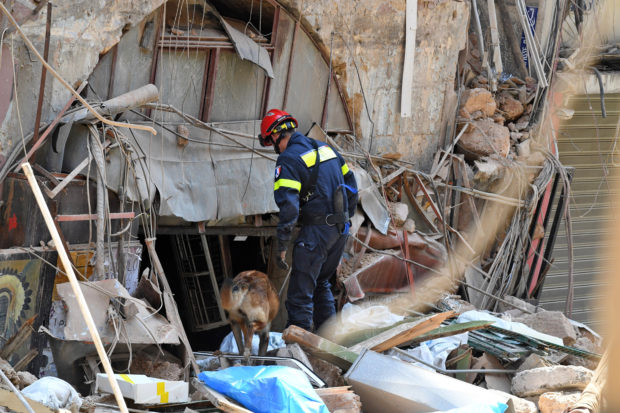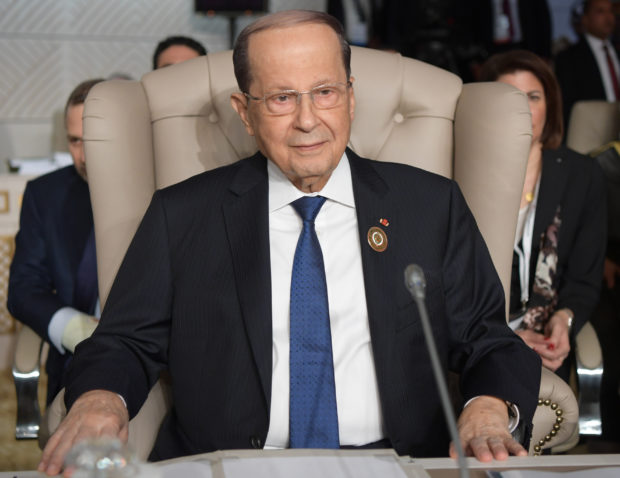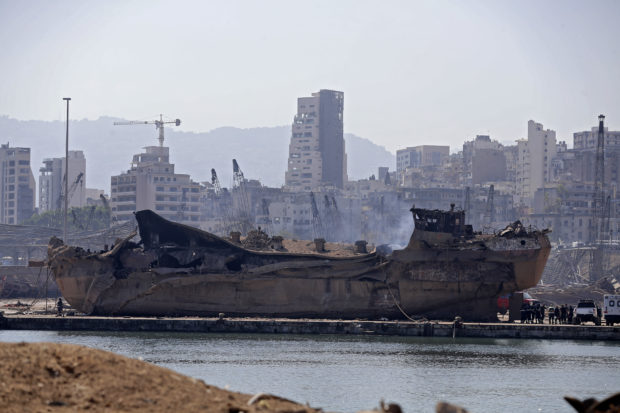Lebanon president rejects global probe into port blast

A French rescuer uses a dog to search for victims or survivors amidst the rubble of a building in the Gemayzeh neighborhood on August 6, 2020, two days after a massive explosion in the Beirut port shook the capital. – The blast caused massive destruction and killed at least 113 people, heaping misery on a country in crisis. (Photo by – / AFP)
BEIRUT — Lebanon’s president Friday rejected any international probe into the catastrophic port blast, saying a missile or negligence could have been responsible as rescuers desperately combed the rubble for survivors.
The entrenched ruling class has come under fire once again since Tuesday’s explosion, which killed at least 154 people and devastated swathes of the capital.
The revelation that a huge shipment of hazardous ammonium nitrate fertilizer had languished for years in a warehouse in the heart of the capital served as shocking proof to many Lebanese of the rot at the core of their political system.
Even Lebanese President Michel Aoun admitted Friday that the “paralyzed” system needed to be “reconsidered.”
“We are facing changes and reconsidering our system, which is built on consensus, after it was seen to be paralyzed and incapable of swiftly executing decisions,” Aoun told reporters.
He pledged “swift justice” but rejected widespread calls for an international probe, telling a reporter he saw it as an attempt to “dilute the truth.”
“There are two possible scenarios for what happened: it was either negligence or foreign interference through a missile or bomb,” he said, the first time a top Lebanese official raised the possibility that the port had been attacked.

Lebanese President Michel Aoun attends the opening session of the 30th Arab League summit in the Tunisian capital Tunis on March 31, 2019. (Photo by FETHI BELAID / POOL / AFP)
What ignited the massive shipment of fertilizer remains unclear – officials have said work had recently begun on repairs to the warehouse, while others suspected fireworks stored either in the same place or nearby.
Near the seat of the explosion, by the carcass of the port’s giant grain silos, rescue teams from France, Russia, Germany, Italy, and other countries coordinated their search efforts.
Four bodies were uncovered near the port’s control room, where a significant number of people were expected to have been working at the time of the blast.
No one has been found alive.
“I am waiting to hear that you have been rescued alive, my dear,” tweeted Emilie Hasrouty, whose brother is among the missing.
“There wasn’t a door I didn’t knock on to know what happened to you, and now that the waiting is almost over, I am paralyzed with fear.”
100,000 children homeless
At the port, reduced to an enormous scrapyard, excavators removed mangled shipping containers to clear a path for the rescuers.
Civil defense teams anxiously watched a sniffer dog as he paced around a gap under a fallen crane.
Beirut has received a stream of international assistance since the blast, with the president of the European Council, Charles Michel, set to visit the ravaged capital on Saturday.
French President Emmanuel Macron was the first world leader to touch down in Lebanon on Thursday, where he pressed officials to enact deep reform ahead of an aid conference planned in the coming days.
The World Food Program said it would allocate food to affected families and boost wheat imports to replace lost stocks from the port’s disemboweled silos.
The World Health Organization, meanwhile, called for $15 million (12.7 million euros) to cover immediate humanitarian health needs.
Lebanon’s hospitals, already strained by rising coronavirus cases and a severe economic crisis, were severely damaged by the blast and have been overwhelmed by casualties.
Relief flights from Iran, Saudi Arabia, and the United Arab Emirates landed in Lebanon on Friday, following others from France, Kuwait, Qatar, and Russia.
Two days after the blast, Lebanese were flocking to a 20-tent Russian field hospital newly established in the capital’s largest sports stadium.
The United Nations said up to 100,000 children are among the 300,000 people made homeless, including many who have been separated from their families.

A picture shows a blown up ship which was thrown on the land at Beirut port on August 7, 2020, three days after a massive blast there shook the Lebanese capital. – Rescuers combed through the rubble of Beirut port today in a search for survivors watched breathlessly by relatives of the missing, after an investigation. (Photo by JOSEPH EID / AFP)
Circle of suspects widens
With destruction from the blast extending over half of the capital and the damage expected to cost more than $3 billion, world leaders have backed calls from ordinary Lebanese for those responsible to be held accountable.
In his snap visit on Thursday, Macron stressed the need for an international investigation after meeting Lebanese politicians, including representatives of the powerful Shiite Hezbollah movement, whose leader Hassan Nasrallah was scheduled to speak later on Friday.
Lebanese authorities had announced their own probe into Tuesday’s explosion and by Friday afternoon had detained 21 people, including customs officials and port engineers, a judicial source told AFP.
The port’s general manager Hassan Koraytem was among them, the source added.
Dozens more were being interrogated by Lebanon’s military court, which is focusing its efforts on administrative and security officials at the port as well as government authorities who may have ignored warnings about explosive materials.
“The list of arrests will reach the top guys, who are now among the suspects,” the source said.
Lebanon’s central bank also ordered asset freezes for seven port and customs officials, an official and a banking source told AFP.
The measures did not dampen the anger in Beirut’s streets, where dozens of demonstrators scuffled with security forces late Thursday, drawing a volley of tear gas.
Lebanon’s leadership was already deeply unpopular, with a wave of mass protests that erupted in October only abating in the face of the coronavirus pandemic.